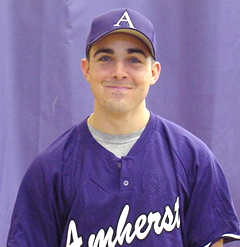The following “Six Questions” short interview with Josh Santry, Senior Director of Broadcasting at IF Management, was conducted by Belmont University Law School student and aspiring sports/entertainment agent Mark J. Burns. Connect with Josh on Twitter and Linkedin.

1. You graduated in 2005 from Amherst College and have been with IF Management ever since. How has your position within the company evolved over the past eight years?
I can’t believe it’s been 8 years! I started as an intern right out of college and for 4 months worked strictly in an administrative capacity. The great thing about working at a company this size is that you’re exposed to so much right from the beginning. Even though you aren’t adding to the dialogue you’re able to listen to negotiations and learn about the nuances of the Agent-Client relationship.
After 4 months I was offered a full-time position as an “Information Aggregator” (not an official title certainly). I was responsible for reading every industry trade and sports media column to gather as much information as possible that I would then summarize in daily emails to the group. In addition, I was tasked with finding up-and-coming Anchor/Reporters & Play-by-Play voices that could be of interest to the Agents. After 8 months (so a year at the company total), I was given the green light to go out and recruit my own clients.
2. As the Senior Director of Broadcasting, what are your day-to-day responsibilities?
My primary responsibilities every day involve looking out for the best interests of my 35 clients. That could involve negotiating a contract, pitching a client for a specific opportunity, giving a client feedback on their work and/or putting a demo reel together. In addition, there are conversations with clients every day about a myriad of topics: anything from the pros & cons of specific job opportunities, trends in the industry, or what’s going on in their personal lives.
The two other domains I’m always working within are 1) Talking to executives at the various sports networks/cable networks (checking in on clients, learning about upcoming needs, etc.) and potential clients (whether it’s talent that we recruited, referrals from current clients or those that sent material unsolicited).
3. Prior to joining IF Management, did you hold any internships/volunteer positions? If yes, how did those prepare you to eventually work for IF?
When I see resumes we get today from kids applying for internships, it amazes me how unprepared I was. I played baseball at Amherst so my summers were spent playing for 2-3 semi-pro league teams in NJ. I really only worked odd jobs until the summer before my senior year when I worked for the New Jersey Jackals, an independent league baseball team in Northern NJ. It was a true jack-of-all trades position, anything from ticket sales to helping put the tarp on the field to donning the mascot costume (my personal favorite). More than anything, this made me more resolute in my desire to find a way to work in sports in some capacity.
4. What are 3 to 5 essential and tangible skills necessary to work in the sports agency industry and talent representation?
The most important skill is to be an effective communicator. Whether you’re pitching a client to an executive or talking to a potential client, you need to be able to communicate your message effectively, both via email and over the phone/in person.
Be a good listener. We all have a lot going on, but it’s important when you’re on a call, especially with a client, that you don’t try to multitask. There’s a big difference between actually listening and waiting for your turn to talk.
Be curious. Be confident & comfortable enough to ask questions when you don’t understand and/or you want to learn more about an issue.
Be yourself. Seems easy, but I know that in my first year as an Agent, I was acting the way I thought Agents should act. I quickly learned that not only was I not comfortable working that way, but people could see right through it. Once I became confident that I could be effective just being me, I enjoyed my job so much more and started to see results.
Think consciously. Don’t just agree with the status quo or the party line. Come up with your own opinion on a topic — you may not be in a position early in your career to act if you disagree with a decision or thought process, but it will help you down the line if you get in the habit of thinking independently.
5. What is the most rewarding aspect of your job?
Without a doubt the most rewarding aspect of the job is having a positive impact on the lives of people that you genuinely care about. Being able to help someone fulfill their dream and to be there every step of the way really opens your eyes to the amount of work, sacrifice and intelligence it takes to be successful in this business. It’s very humbling, and I love the challenge of having to match the high levels of intensity and intelligence that my clients bring to their work every day.
6. In 140 characters or less, what advice would you give to aspiring sports/entertainment business professionals who want to work in the agency world?
Do everything with a purpose and always be present. Focus on the process and maximize the value of whatever you’re doing at that moment.
